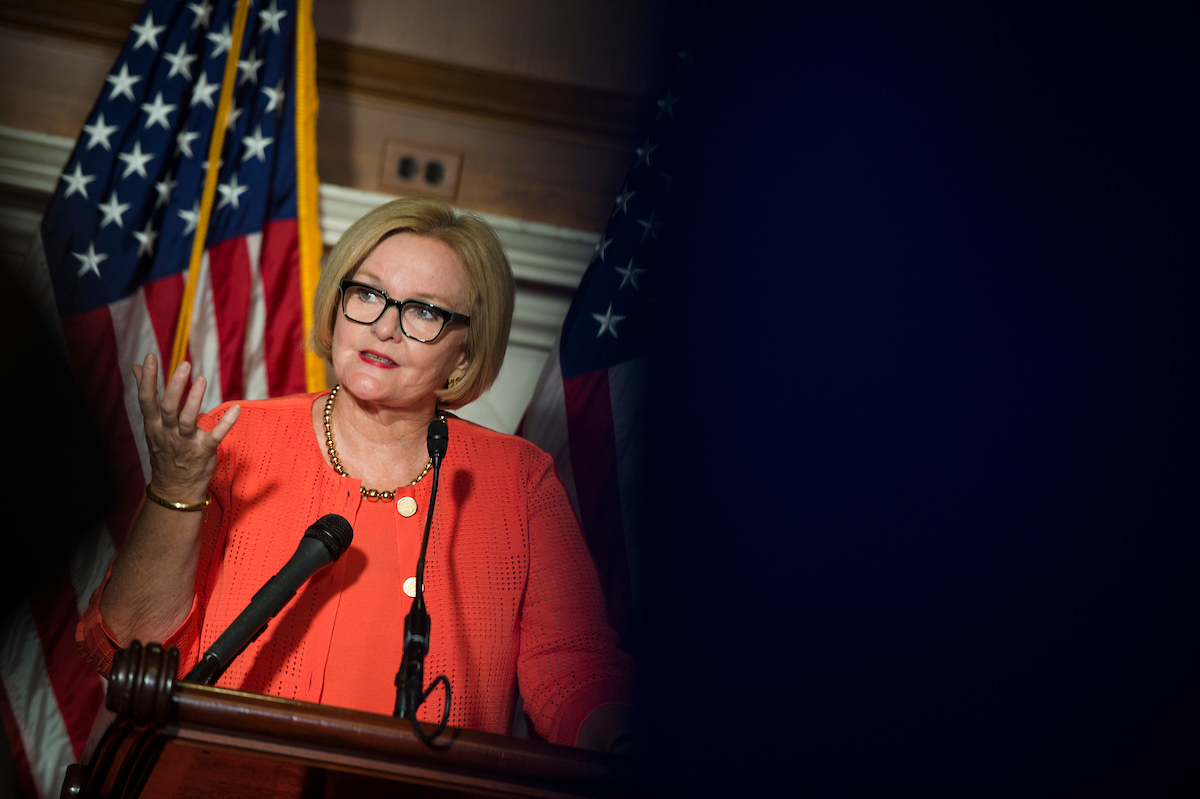McCaskill: Verdict’s Still Out after Meeting with SCOTUS Nominee Kavanaugh
Missouri Democrat said she would likely decide after the confirmation hearings

SPRINGFIELD, Mo. — Less than 15 minutes into Sen. Claire McCaskill’s campaign event, Rachel Goldberg stood up to ask the senator a question.
Goldberg was concerned that President Donald Trump’s Supreme court nominee Brett Kavanaugh opposed Roe v. Wade, a Supreme Court decision that effectively legalized abortion. The 34 year-old counselor wanted to know if McCaskill had decided whether to support Kavanaugh.
McCaskill hasn’t decided yet, she told Goldberg and the roughly 50 voters gathered at a local Teamsters hall.
“I’m going to wait until his hearing and watch him be cross-examined about his record. But I am — I feel like I’m back in law school, I’m reading so many opinions,“ the Missouri Democrat told a group of roughly 50 supporters gathered at a local Teamsters hall. “But I have not made a decision yet. I probably won’t until after the hearings.”
Goldberg, a Democrat, said after the event, “I was hoping for clearer opposition.” Watch: Senate GOP Stacks 167 Boxes to Illustrate Amount of Kavanaugh Papers Getting Released
McCaskill met with Kavanaugh on Tuesday, and she told reporters after the campaign event here that she did not discuss Roe v. Wade with the judge.
“He’ll get asked about that at the hearing and frankly he’s not going to give an answer. He’s not going to say how he’d rule on Roe v. Wade,” McCaskill said. “So I didn’t want to take the precious time I had when I knew there were some other more complicated legal issues I wanted to get into with him.”
McCaskill said she wanted to hear about Kavanaugh’s judicial philosophy and his view on so-called dark money in politics.
During the campaign event she said she is also interested in Kavanaugh’s position on a lawsuit working its way through the courts that challenges the Affordable Care Act. McCaskill’s Republican opponent, Missouri Attorney General Josh Hawley, has signed onto the lawsuit along with other GOP attorneys general.
Speaking to reporters after the event, McCaskill made a passing reference to “the Bivens decision” when describing her discussions with Kavanaugh. It was an apparent reference to a 1971 case relating to the ability to sue the federal government over a violation of constitutional rights. According to the New York Times, Kavanaugh wrote as a judge on the Court of Appeals for the D.C. Circuit in 2015 that the Supreme Court precedent in Bivens did not apply to an American citizen who alleged American officials violated his rights while he was in Africa.
Asked if she was satisfied after the meeting, McCaskill said. “I don’t know how to characterize satisfied. I don’t think that’s a characterization I would make. I still have a lot more information I need to get.”
Two other voters asked questions about the Supreme Court at the late afternoon event. The voters in the hall were a friendly audience for McCaskill, giving her a standing ovation when she entered the room.
She was asked when the hearings would occur, and if the nominee would be confirmed by 50 votes or if the threshold would be 60. Last year, Senate Republicans used a procedural maneuver to confirm Trump’s first high court nominee with a simple majority, rather than the traditional 60 votes.
McCaskill said there was nothing that could be done about the vote threshold since Republicans were still in charge, and she noted that the thin margin in the Senate would make for a close vote. She said that if GOP Sens. Lisa Murkowski of Alaska and Susan Collins of Maine vote “yes” on Kavanaugh, “it’s over.”
McCaskill later clarified to reporters that her “it’s over” comment was referring to the process that allows high court justices to be confirmed along partisan lines.
“I think I said that I think we should have 60 votes for a Supreme Court justice. So I don’t think it’s a good thing,” McCaskill said of the scenario Murkowsi and Collins voting yes would lead to Kavanaugh’s confirmation. McCaskill said a 60-vote threshold would ensure Supreme Court nominees need bipartisan support.
Hawley has seized on the Supreme Court vacancy to pressure McCaskill to break with her party and back Kavanaugh. McCaskill did not support Trump’s first high court nominee, Judge Neil Gorsuch.
Hawley sees the Supreme Court vacancy as a defining issue in the race, and says Missourians want conservative justices on the bench.
“I know from voters who voted for the president two years ago, for many, many, many of them, the Supreme Court and the federal courts were a huge issue,” Hawley said in a phone interview Thursday. Trump won the Show-Me State by 19 points in 2016.
“When you think about what’s on the line in the court — immigration policy, the Second Amendment, religious liberty — these are things that really matter to voters and really affect their day-to-day lives,” Hawley said.
Inside Elections with Nathan L. Gonzales rates the Missouri Senate race a Toss-Up.





